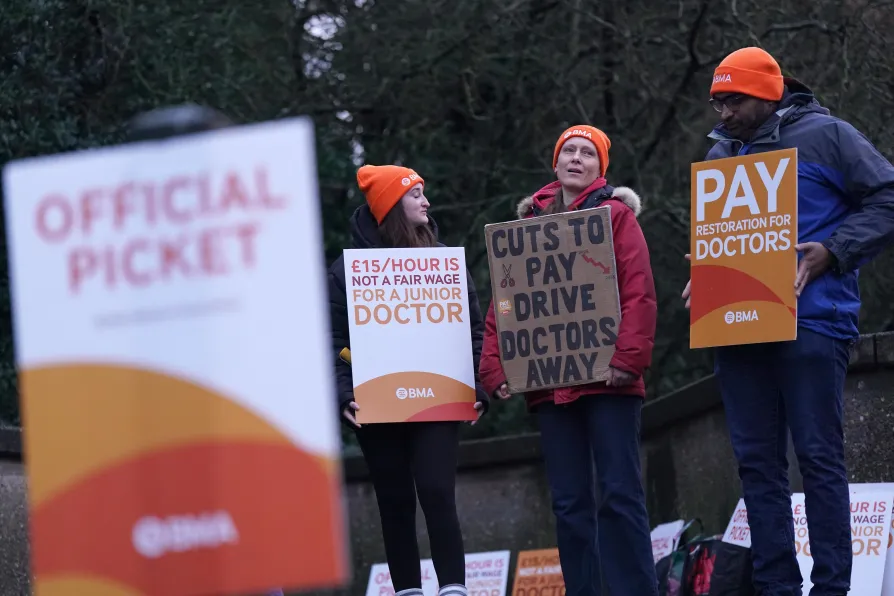Unions slam use of review bodies and long-term decline in value of wages

 Junior doctors and members of the British Medical Association (BMA) outside Queen's Medical Centre, Nottingham, January 3, 2024
Junior doctors and members of the British Medical Association (BMA) outside Queen's Medical Centre, Nottingham, January 3, 2024
DOCTORS are threatening strike action after ministers announced yesterday that public-sector workers will receive barely above-inflation pay rises.
The British Medical Association (BMA) said the 4 per cent pay offer for doctors does not come close to restoring years of real-terms cuts.
Other NHS staff in England including nurses, midwives and physiotherapists will receive just 3.6 per cent.
The National Education Union (NEU) warned it will “register a dispute” with the government unless it fully funds the teacher pay rise, also at 4 per cent, part of which schools must cover from their own overstretched budgets.
The offer comes after ministers accepted the recommendations of independent pay review bodies, despite widespread criticism of the process, which unions say is out of date and politicised.
Inflation jumped to 3.5 per cent in April, up from 2.6 per cent in March and the highest since January 2024.
But BMA council chairman Professor Philip Banfield warned that the pay rise does not do enough to restore doctors’ pay after previous salary freezes.
“Doctors’ pay is still around a quarter less than it was in real terms 16 years ago,” he said.
“[This] ‘award’ delays pay restoration even more, without a government plan or reassurance to correct this erosion of what a doctor is worth.
“No-one wants a return to scenes of doctors on picket lines… but today’s actions from the government have sadly made this look far more likely.”
NHS staff who are members of the GMB union and the Royal College of Nursing (RCN) will be asked to vote on whether to accept the award.
RCN general secretary and chief executive Professor Nicola Ranger warned that it would be “entirely swallowed up by inflation and does nothing to change the status quo – where nursing is not valued, too few enter it and too many quit.”
She said: “Nursing staff have suffered 15 years of pay erosion and this award is symptomatic of a broken system which erodes our pay each year and keeps nursing staff weighted to the bottom.
“By attaching themselves to a failed pay review body process and refusing to enter direct talks with unions, ministers ignored the nurse workforce crisis and charted the course for it to deepen.”
Unite general secretary Sharon Graham said: “NHS workers are still suffering from historic pay cuts in real terms over the last 15 years and are contending with a worsening cost-of-living crisis.
“If the government is ever going to resolve the NHS crisis it will need to stop kicking the can down the road.”
Unison’s head of health Helga Pile said the rise barely matches inflation and will reach workers four months late.
“Health workers had high hopes this government would have learned from the mistakes of its predecessors, but a reliance on the slow, outdated and unnecessary pay review body process has once again failed to deliver,” she said.
In education, unions condemned the partial funding of teachers’ pay rise — with the government pledging only £615 million, covering about three-quarters of the cost.
NEU general secretary Daniel Kebede said in many schools this would result in “cuts in service provision to children and young people, job losses and additional workloads for an already overstretched profession.”
“Unless the government commit to fully funding the pay rise, then it is likely that the NEU will register a dispute with the government on the issue of funding,” he said.
NASUWT acting general secretary Matt Wrack also warned that many schools could be placed in “severe financial difficulty” without extra funding.
He said the union has suggested ways the government could raise revenue, including by introducing a 2 per cent wealth tax.
Most armed forces personnel will receive 4.5 per cent and prison officers, civil servants and judges 4 per cent.
But senior civil servants are only being offered 3.25 per cent, and unions say the increase will not protect workers from falling further behind.
Public and Commercial Services union general secretary Fran Heathcote called the 3.25 per cent rise “derisory when tens of thousands of civil servants are paid at or barely above the minimum wage.”
TUC general secretary Paul Nowak said: “Ministers need to talk directly to unions to address the root causes behind dedicated and experienced public servants quitting their professions.
“We need a clear, jointly agreed long-term strategy to improve public-sector pay, alongside other crucial issues such as better working hours, more manageable workloads and enhanced flexible working options.”













